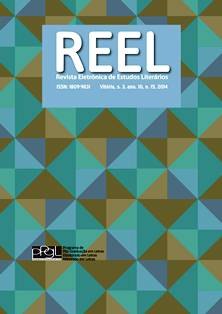REPRESENTAÇÃO, SUJEITOS, TERRITÓRIOS E FRONTEIRAS NO CINEMA AUTORAL DE NADINE LABAKI E AMOS GITAI
Resumo
Resumo: Este artigo apresenta, em sua primeira parte, o que é e como se classifica a categoria World Cinema no cinema contemporâneo. A seguir, faremos uma aproximação entre as estéticas cinemáticas dos anos de 1950-60
que constituíram o cinema mundial e a relação com a atual produção de filmes que compõe a categoria denominada World Cinema. Posteriormente, mostramos alguns exemplos de filmes que constituem tal categoria através de dois realizadores que atuam no cinema contemporâneo: a cineasta, produtora e atriz Nadine Labaki, nascida no Líbano, dentre as suas produções mais conhecidas estão os longas-metragens Caramelo (Líbano, França - 2007) e E agora aonde vamos? (Líbano, França, Egito, Itália - 2011), e o diretor israelense Amos Gitai
que é dono de uma vasta filmografia de abordagem político-social, nesta ocasião, será representado pelo filme Free Zone (Israel, Bélgica, França, Espanha - 2005). A produção destes realizadores está focada nas noções de
espaço, tempo e subjetividades tensionadas à condição de territórios, limites e fronteiras, que não são apenas geográficas, mas principalmente, histórico-político e cultural. Neste sentido, a linguagem cinematográfica será observada como processo discursivo e midiático que mobiliza tal representatividade de subjetividades singulares.
Palavras-chaves: Cinema contemporâneo mundial; subjetividades; territórios e fronteiras.
Abstract: This article presents in its first part, what it is and how it ranks the World Cinema category in contemporary cinema. Then we will make a rapprochement between the cinematic aesthetic of the years 1950-60
which were the world cinema and the relationship with the current production of films that make up the category World Cinema. Subsequently, will know some examples of films that constitute such a category by two directors working in contemporary cinema: a film director, producer and actress Nadine Labaki, born in Lebanon, among his best-known productions are the feature films Caramel (Lebanon, France - 2007) and And now where are we going? (Lebanon, France, Egypt, Italy - 2011), and the Israeli director Amos Gitai who owns an extensive
filmography of political-social approach on this occasion, will be represented by the movie Free Zone (Israel, Belgium, France, Spain - 2005). The production of these filmmakers is focused on the notions of space, time and the strained condition of territories, boundaries and borders subjectivities that are not only geographical, but mostly, historical, political and cultural. In this sense, the film language will be seen as a discursive and media process that mobilizes such representativeness of individual subjectivities.
Keywords: Contemporary World Cinema; subjectivities; territories and boundaries.

